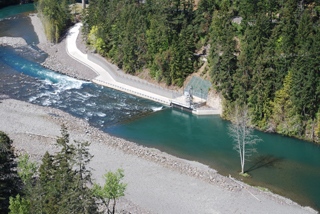Location: Olympic National Park
General contractor: Watts-DelHur joint venture
Owner/developer: National Park Service
Engineer: URS Corp.
Contract amount: $71.5 million

Photo courtesy of Watts-DelHur Watts-DelHur diverted the Elwha River to a temporary channel, allowing the project team to compress three seasons of in-water work into one.
|
The Elwha water facilities project was one of the last steps to be taken before the Elwha and Glines Canyon dams could be removed and the restoration of the Olympic Peninsula’s Elwha River ecosystem could begin. The project will protect water users from the century-long accumulation of sand, gravel and rocks that will flow downstream upon removal of the dams.
The Watts Constructors-DelHur Industries team completed work a year ahead of schedule with a perfect safety record. It was the National Park Service’s largest contract to date.
Four projects were consolidated into one: the Elwha River levee improvements, the Elwha surface water intake, the Elwha water treatment plant and the Crown Z Road improvements. All four were constructed simultaneously while construction of a bridge over the Elwha River limited access to the site.
Watts-DelHur diverted the Elwha River to a temporary diversion channel. This allowed the project team to complete what was expected to be three seasons of in-water work in only one. All upstream and downstream movement of native species remained unencumbered, and when construction work was complete the river was restored to its original channel in time for the regular migratory season.
In order to complete the in-river work in only one season, Watts-DelHur employed value engineering techniques for several parts of the project. Most critical was the substitution of precast concrete panels (cast on site) in place of the prescribed steel sheet piles that would not have been available until at least the second season.
Watts-DelHur worked around the clock for 80 days to ensure the in-river work would be completed on time.
The joint venture self-performed 88 percent of the work, and its workforce, in combination with subcontractor crews, logged 375,000 man-hours over 26 months with no lost-time accidents. Additionally, 90 percent of the craft workers were local hires, giving the depressed local economy a boost.
Because of the early delivery of the project, the National Park Service was able to accelerate by a year its program to restore the Elwha River, ultimately returning the river to its natural, free-flowing state.